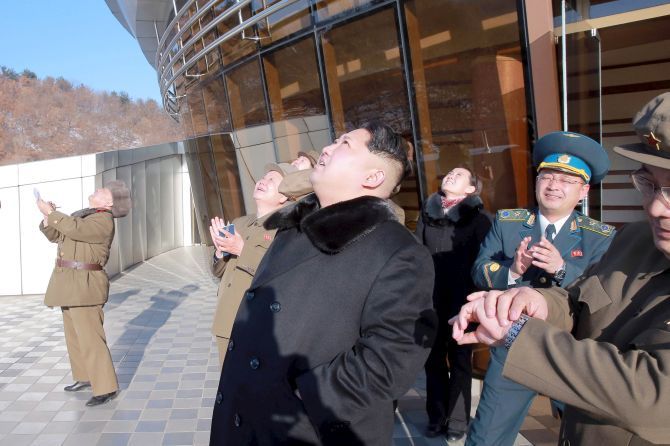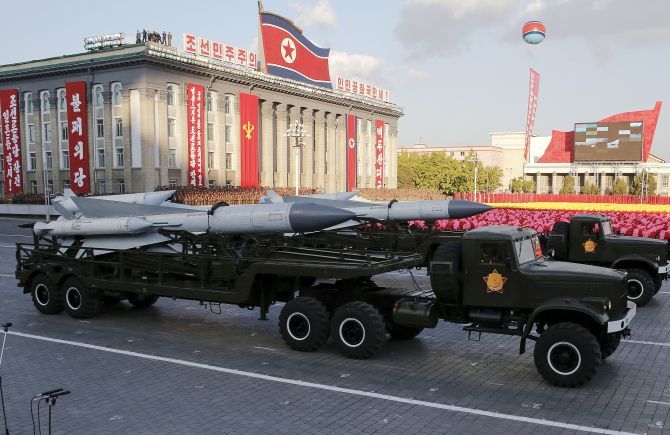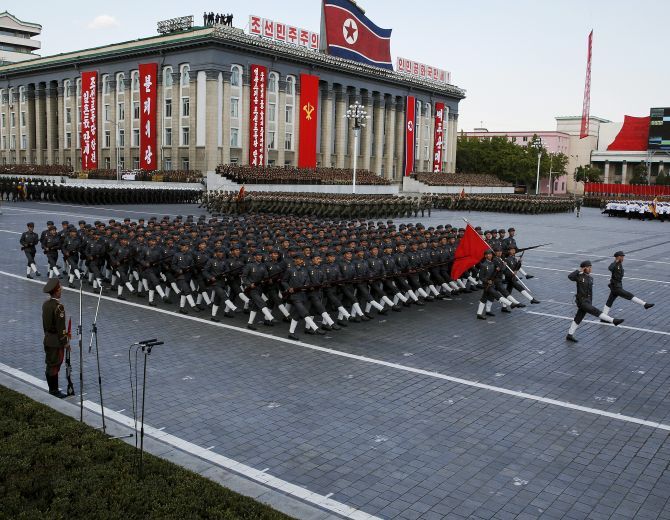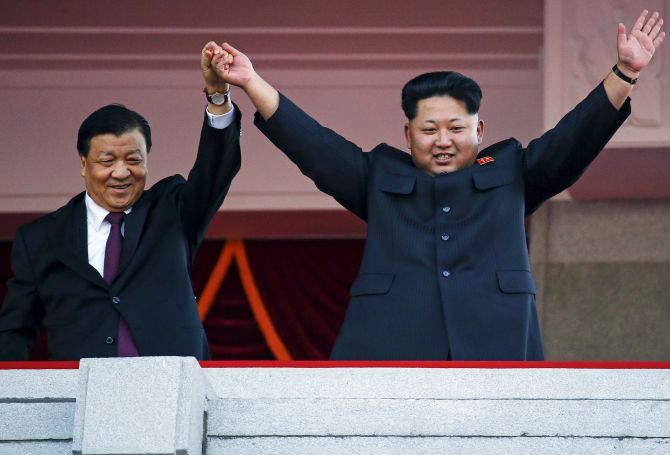
While trying to persuade North Korea to give up its provocative actions, engaging China is the first hurdle that world leaders will have to deal with, says Rajaram Panda.
North Korea is in the news again, as always for the wrong reasons.
On September 5, when world leaders gathered in the eastern Chinese city of Hangzhou for the G-20 summit, North Korea launched three missiles into the Sea of Japan in another cry seeking world attention.
What message did Pyongyang really send to the world with its missile launch?
The three missiles launched from near Hwangju in the south-western province of North Hwanghae reportedly flew about 1,000 km and fell in Japan's exclusive economic zone in the Sea of Japan.
According to the South Korean military and Japanese defence ministry, the missiles fell into waters 200 to 250 km west of Okushiri Island in Hokkaido.
The missiles believed to be the mid-range Rodong with a range of 1,300 km were chosen for launch because North Korea's leader Kim Jong-un probably wanted to impress the world with its missile attack capability that it has achieved.
Kim 'expressed great satisfaction' over the launch and called on his country to bolster its nuclear forces.
From past experience one can notice that North Korea launches missile and rocket tests when international attention is focussed on northeast Asia.
This time too, it chose the time when world leaders had gathered for the G-20 summit of advanced and emerging economies.

The launches came four days before the 68th anniversary of the founding of North Korea's government, and days after the US and South Korea ended annual military drills, which North Korea regularly describes as a dress rehearsal for invasion.
North Korea's choice of timing to conduct this provocative missile launch does not surprise analysts. Leaders who gathered in Hangzhou took serious note of this North Korean act getting President Barack Obama to huddle with Chinese President Xi Jinping, Japan's Prime Minister Shinzo Abe and South Korean President Park Geun-hye to discuss the issue.
When South Korea and the US agreed in August to deploy the Terminal High Altitude Area Defence missile system in South Korea, both China and Russia criticised this move.
China's displeasure stemmed from the fact that the THAAD missile defence system brings China within its range, perceived to be threat to its security.
Pyongyang's latest provocations did not deter President Xi to sit down with President Park, the North's chief enemy, to discuss ways to deal with Pyongyang's latest act.
What worries leaders is that Pyongyang's missile launch demonstrates that North Korea has made steady progress in developing its missile systems that target its neighbours, Japan and South Korea, as well as the continental US including the US military based in Japan and South Korea.
The September 5 missile launches follows North Korea's launch of submarine-based ballistic missiles on August 24. Here too, the timing was significant when it coincided with the meeting of foreign ministers of Japan, China and South Korea in Tokyo to discuss regional issues, including North Korea's nuclear sabre-rattling.
The submarine-based ballistic missiles could potentially put more of South Korea and Japan within North Korea's missile range and are harder than land-based missiles to detect before launch.
Pyongyang claimed both launches as a success, which is why both Japan and South Korea expressed concern.
North Korea is barred from such actions under United Nations sanctions. As world powers seek ways to cope with new threats like Islamic State and deal with such emerging challenges to international security, North Korea continues to make steady technological advancement, further adding to tensions.
Successive US Presidents have been unable to create a better situation in North Korea, leaving future Presidents to grapple with the crisis becoming graver by the years. Whosoever succeeds Obama has the onerous task of finding new ways to deal with the North Korean issue of developing destabilising weapons systems rather than mere expression of concerns and further sanctions.
Mere talks of redoubling efforts to keep North Korea under check are not enough as such responses have yielded no positive outcome so far.

Both the Japan and South Korean militaries believe the missiles launched on September 5 were probably mid-range Rodong missiles, which flew about 600 miles west before crashing into the Sea of Japan within Japan's Air Defence Identification Zone.
As per international practice, Pyongyang needs to give advance notice before such launches, but it launches missiles 'without giving any prior navigational warning.'
While condemning Pyongyang's actions, Japan's Defence Minister Tomomi Inada observed that North Korea's missile technology has substantially improved, presenting a grave national security threat to Japan.
This is because past weaponry tests which were claimed as success by Pyongyang were actually failures as missiles were detected as exploding in mid-air or wobbled and crashed well short of presumed targets.
Japan's Coast Guard issued a warning for navigation in waters near Japan, and sent patrol ships and aircraft to search for missile debris.
Instructions were issued to relevant government agencies to gather and analyse information so that appropriate steps could be taken to ensure the safety of aircraft and ships.
Prime Minister Abe ordered from Hangzhou stepped-up security and intelligence-gathering measures related to the missiles. Tokyo sees the North Korean action and its ability to strike the Japanese archipelago as a grave threat to national security.
Japanese Foreign Minister Fumio Kishida lodged a protest with North Korea through diplomatic channels in Beijing and termed it 'an extremely dangerous act.' Japan, Kishida said, would work closely with the US and South Korea in seeking an emergency meeting of the UN Security Council. A special task force was created in Abe's office to gather intelligence.
South Korean President Park remarked that North Korean threats were real with Pyongyang steadily improving its weaponry system. She cited the growing threats as justification for deployment of the missile-defence system.
Regional security analysts doubt if North Korea has yet developed a functioning long-range missile capable of reaching the continental US, though they admit that North Korea has been making steady advances in its missile system that can reach US forces stationed in the region as was demonstrated by North Korea's successful mid-range ballistic missile test in June.
North Korea has shown little respect for international warnings and punishments. It has not cared for the UN Security Council's imposition of tough punitive measures imposed in March after its fourth nuclear test in January and missile launches the following month.
On the other hand, Pyongyang is engaged in further missile tests and making advances in its weapon systems. Another worry for the international community is Pyongyang's confirmation in August of resumption of plutonium production at its Yongbyon nuclear complex, which it had agreed in 2007 to suspend activity.
One thing seems clear: North Korea is unlikely to give up its nuclear weapons. It is the only deterrence that would secure its survival. North Korea realises its vulnerability if it gives up its nuclear option.
Pyongyang's actions seem to be a cry for the international community to accept it as a Nuclear Weapons State and as Tetsuo Kotani observes, 'go into arms control talks with the US in exchange for a peace treaty.'
It is also possible that the latest missile launches were a means to insult the G-20 gathering. It could also be seen as a response to the decision by the US and South Korea to deploy THAAD to counter missile and nuclear threats from North Korea.
No single reason can be attributed to Pyongyang's action and combination of several considerations could be behind the way North Korea behaves.

Since China itself worries that the THAAD system's radar will track its military capabilities and disapproves of its deployment, Beijing could be secretly sympathising with Pyongyang's belligerent response.
'Mishandling the issue is not conducive to strategic stability in the region and could intensify disputes,' President Xi remarked. This could be open to interpretation as to where China's stance actually lies.
While North Korea's missile launches could persuade Xi to soften his stance on THAAD, President Park would argue more vigorously justifying the decision to deploy THAAD because of Pyongyang's missile launch.
When other leaders sought action against North Korea, China's foreign ministry spokeswoman Hua Chunying called for calm. 'At the moment,' she said, 'the situation on the (Korean) peninsula is quite complex and sensitive' and that 'all relevant parties can avoid taking actions that may escalate tensions, and can make joint efforts to maintain peace and stability on the peninsula.'
Beijing views the THAAD deployment as a larger conspiracy by the US to shift the regional power balance in favour of its allies in Asia. Having a US-made, US-run missile system in its backyard increases China's discomfort, which is why it views the THAAD system as 'killing a chicken with an axe.' So, things are complicated.
At Japan's request, Obama, Abe and Park met to decide the next steps to deal with North Korea, whose acts are in breach of past Security Council resolutions banning the use of ballistic missile technology.
If a new statement rebuking North Korea for its action has to be issued, all 15 members of the Security Council ought to be unanimous in their views.
Like China played spoilsport in blocking India's entry to the Nuclear Suppliers Group recently, here too China is unlikely to support any statement condemning North Korea for its actions.
As long as deep divisions remain in the Security Council with China, North Korea will enjoy a free hand.
While trying to persuade North Korea to give up its provocative actions, engaging China to bring it on the same platform is the first hurdle that world leaders would have to deal with.
Consensus building is of prime importance to deal with the North Korean issue.
Dr Rajaram Panda is Indian Council for Cultural Relations India Chair Visiting Professor at Reitaku University, Japan.






 © 2025
© 2025